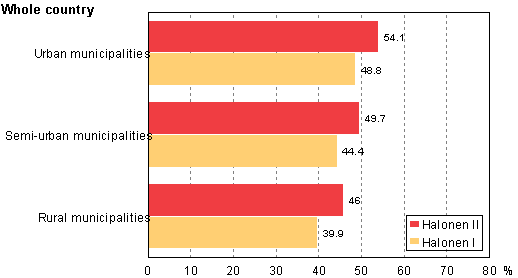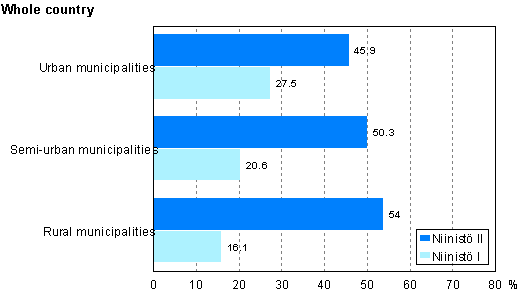Press release 30.1.2006
Tarja Halonen successful in urban municipalities
The election victory of Tarja Halonen, the candidate of the Social Democratic Party, in the second round of the Presidential election was based on her success in urban municipalities, where she received 8.2 percentage points more votes than Sauli Niinistö, the candidate of the National Coalition Party. Exceptions to this were the urban municipalities of the constituency of Uusimaa, where Niinistö gained almost equally much. Looking at the whole country, Halonen lost to Niinistö by 0.6 percentage points in semi-urban municipalities and by 8 percentage points in rural municipalities.
At the level of the whole country Tarja Halonen received 5.5 percentage points more votes than in the first round of the election. The differences between urban, semi-urban and rural municipalities were relatively small. Compared with the first round, Halonen received, on average, 5.3 percentage points more votes in urban and semi-urban municipalities and slightly more, that is, 6.1 percentage points, in rural municipalities. The result was similar regardless of the constituency or the political background of the area in question.
The votes freed from the right-wing party candidates - mainly Matti Vanhanen - do not appear to have moved much in favour of Tarja Halonen. For example, Halonen gained slightly more than average, that is, 6.4 percentage points of votes in the rural municipalities of the constituency of Vaasa, but on the other hand, Sauli Niinistö gained in the same area as much as 48.9 percentage points of votes compared with the first round of the election. The change was very similar to this in the constituencies of Central Finland, North Savo, North Karelia, Oulu and Lapland. In total, Sauli Niinistö gained 24.1 percentage points compared with the first round.
Support for the candidates in different municipality groups in the Presidential election 2006, rounds 1 and 2


In the second round of the Presidential election the voting turnout was 77.2 per cent, that is, 3.3 percentage points higher than in the first round. The change was similar in different municipality groups. In urban municipalities the voting turnout grew by 3.7 percentage points, in semi-urban municipalities by 3.1 percentage points and in rural municipalities by 2.3 percentage points.
Source: Election Statistics. Statistics Finland
Inquiries: Mr Risto Lättilä +358 9 1734 3252; vaalit.tilastokeskus@stat.fi
Director in charge: Ms Riitta Harala
Links:
Statistical
release related to the press
release
